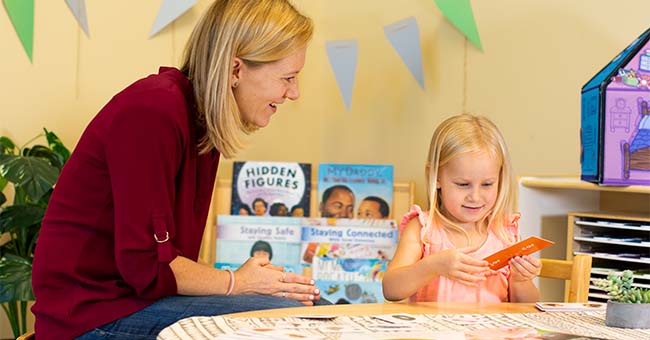
In the seventh installment of Dr. Tonia Durden's newest series Dear CRT, she reframes parent engagement into something that is much more inclusive, meaningful, and productive: Family engagement. Explore the rest of her series here.
Dear CRT,
I have yet to read an early childhood program's handbook or mission statement that doesn't speak to the importance and commitment to positive parent engagement. Unfortunately what is coined in our field as parent engagement translates to "I want you to do this at home with your child". Also we often associate parent with the mother only. We should focus instead on family engagement . Of course the family and children are the ones who identify who makes up the family unit and for many Black and Brown children this often extends beyond a mother or father to extended family and community members.
When we think about culturally relevant teaching, we focus on family and community engagement that is culturally meaningful and inclusive. Culturally relevant teachers are committed to family engagement that is culturally responsive, anti-bias and incorporates the cultural experiences, knowledge and communication styles of diverse students and families.
Culturally relevant teachers, such as yourself, also acknowledge the social injustices, racism and inequities many Black and Brown families and communities face.
Yes, Yes I've read most of your blogs so far, but what exactly does culturally relevant family engagement look like? To address this get on with it reader's spirit I detect, I would like to introduce the Culturally Responsive, Anti-bias Framework of Expectation, Education, Exploration, and Equip (CRAF-E4) by equity scholars Drs. Iheoma Iruka and Stephanie Curenton.
This framework focuses on 4 essential E's of family engagement. In this model, family engagement is a relationship (yes we put a ring on it!) that is cultivated with the family with the common goal of enhancing the holistic development of the child.
The 4E framework guides childhood professionals in considering the following actions:
- Expect: families and students to do their best
- Educate: families on how to support their children's optimal development
- Explore: ways to partner with families and value their strengths
- Equip: families to advocate on behalf of their child's education and well-being
Take a moment and consider ways in which you currently work with families and community members to expect, educate, explore and equip. Be encouraged to learn more about this approach and culturally relevant family engagement by checking out the resource below:
Iruka, I. U., Curenton, S. M.,'I., Eke, W. A. (2014). The CRAF-E4 family engagement model: building practitioners' competence to work with diverse families. Elsevier/Academic Press.
Tune in to the final addition in this CRT series focused on advocacy and culturally relevant teaching!
Best regards,
T. Durden
About the Author
Tonia Durden, PhD, is a clinical associate professor of early childhood and elementary education and is a program coordinator at the Georgia State University College of Education and Human Development. She is also a co-author of the book Don't Look Away: Embracing Anti-Bias Classrooms.
Explore this Series
Dear CRT: Creating Culturally Relevant Classroom Environments
Dear CRT: Responsive Interactions
Dear CRT: Guiding and Nurturing Children
Dear CRT: Approaches to Learning
Dear CRT: How to Be Anti-Racist'Anti-Bias
Dear CRT: Providing Assessments that are Culturally Relevant
